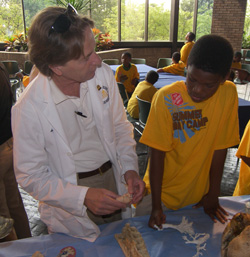
At first glance, you might find Ronald Wade’s job a bit gruesome, but he plays a pretty important role. As the State Anatomy Board director for Maryland, Wade is responsible for the bodies that are donated to science in Maryland. Each year, about 1,500 cadavers are available to Maryland research facilities.
“Anatomy is not just dissecting bodies,” he says. “Yes, a large part of what we do is to implement anatomical preparations and provide surgical areas and research equipment. But we also assist students to enhance and improve learning, and assist clinical staff to develop skills and expertise, all for the sake of the patient.”
In our interview, he explains how he uses math in his work.
Can you explain what you do for a living?
I administer the state’s Body Donation Program, which means I carry out the disposition (cremation and burial) of Maryland’s unclaimed decedent bodies. I also provide for the transport, preparation and medical study use of those bodies to advance medical and health science through education, training and research. And I provide anatomical facilities and prepare cadavers and specimens for medical school study and for clinical use by physicians, surgeons and allied health occupations (i.e. surgical residence, trauma, paramedic & EMT training). Since I manage a public program, I provide aid and assistance to the citizens of Maryland and advance anatomical understanding and knowledge.
When do you use basic math in your job?
Because I work for the state, I manage four budgets, which requires that I calculate and forecast state appropriations revenue and expenses. Then there’s the accounting, which includes data entry for detailed ledgers and updating accounts, and managing inventories and controls. I also need to use chemical formulations to compound dilutions.
Do you use any technology to help with this math?
I do use calculators, computers. In particular, I depend on spreadsheets and databases to perform math functions.
How do you think math helps you do your job better?
In my job, being able to perform arithmetic and math calculations with current technology is basic to minimal acceptable performance.
How comfortable with math do you feel?
It’s a matter of repetitive use and progression. Increased familiarity raises the comfort level and skill.
What kind of math did you take in high school?
I took basic math, binary systems (“new” math), algebra, calculus and accounting. I never liked math — it seemed detached to my life at the time — and was pleased just to get a passing grade. However, I think it was because it was presented in the abstract and not so much as problem-based learning. We should learn and teach math in such a way that takes the mystery of finding the answer but is more challenging for students!
Did you have to learn new skills in order to do the math you use in your job?
I had a basic foundation from school, which I use in my job today.
Happy Halloween everyone! Come back on Wednesday, when we’ll start our month of nesting–with tips on home winterizing and settling in for the colder months (at least for many of us), filled with special family time.